Fleurs du Mal Magazine


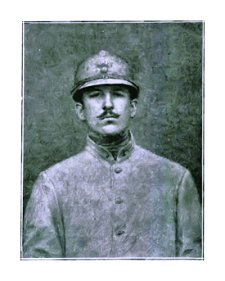
Alan Seeger
(1888-1916)
The Need to Love
The need to love that all the stars obey
Entered my heart and banished all beside.
Bare were the gardens where I used to stray;
Faded the flowers that one time satisfied.
Before the beauty of the west on fire,
The moonlit hills from cloister-casements viewed,
Cloud-like arose the image of desire,
And cast out peace and maddened solitude.
I sought the City and the hopes it held:
With smoke and brooding vapors intercurled,
As the thick roofs and walls close-paralleled
Shut out the fair horizons of the world —
A truant from the fields and rustic joy,
In my changed thought that image even so
Shut out the gods I worshipped as a boy
And all the pure delights I used to know.
Often the veil has trembled at some tide
Of lovely reminiscence and revealed
How much of beauty Nature holds beside
Sweet lips that sacrifice and arms that yield:
Clouds, window-framed, beyond the huddled eaves
When summer cumulates their golden chains,
Or from the parks the smell of burning leaves,
Fragrant of childhood in the country lanes,
An organ-grinder’s melancholy tune
In rainy streets, or from an attic sill
The blue skies of a windy afternoon
Where our kites climbed once from some grassy hill:
And my soul once more would be wrapped entire
In the pure peace and blessing of those years
Before the fierce infection of Desire
Had ravaged all the flesh. Through starting tears
Shone that lost Paradise; but, if it did,
Again ere long the prison-shades would fall
That Youth condemns itself to walk amid,
So narrow, but so beautiful withal.
And I have followed Fame with less devotion,
And kept no real ambition but to see
Rise from the foam of Nature’s sunlit ocean
My dream of palpable divinity;
And aught the world contends for to mine eye
Seemed not so real a meaning of success
As only once to clasp before I die
My vision of embodied happiness.
Alan Seeger poetry
fleursdumal.nl magazine
More in: Archive S-T, Seeger, Alan
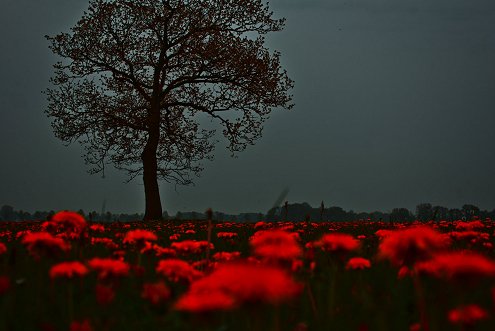
Hans Hermans photos: Red flowers
hanshermans©2014
fleursdumal.nl magazine
More in: Dutch Landscapes, Hans Hermans Photos, Photography
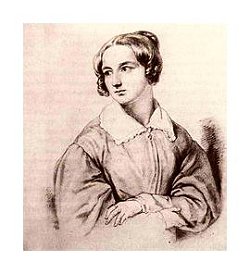
Luise Hensel
(1798-1876)
Zug der Liebe
Ach! vergessen könnt’ ich nimmer
Seiner Liebe, Seiner Pein.
Sein gedenken will ich immer;
Garten, Feld und Wald und Zimmer
Soll mir stets ein Bethaus sein.
Stündlich will ich Ihn begrüßen:
»Sei gepriesen, süßer Freund!«
Alle Blumen, die da sprießen,
Will ich mit dem Thau begießen,
Den um Ihn mein Auge weint. –
Keine Gaben, keine Freuden,
Keine Krone dieser Welt!
Freudig will ich Alles meiden,
Will nur Er von mir nicht scheiden,
Den mein Herz so innig hält.
Wer ein Tröpflein durfte trinken,
Herr! aus Deinem Gnadenmeer,
Der muß ganz darin versinken,
Folgen einzig Deinen Winken
Ohne Sinne, ohn’ Gehör.
Und ich kann Dich nimmer lassen,
Ewig halt’ ich Dich umarmt.
Wolltest Du mich fliehn und hassen,
Müßt’ ich noch Dein Kreuz umfassen,
Bis es jeden Stein erbarmt.
Wärst Du nicht im Himmel drinnen,
Nimmer sehnt’ ich mich hinein. –
All mein Wissen, all mein Sinnen,
Herr! laß ganz in Dich verrinnen,
Ganz in Dir verloren sein.
Münster, Sommer 1819.
Luise Hensel poetry
fleursdumal.nl magazine
More in: Archive G-H, CLASSIC POETRY
 The Sorrows of Young Werther (31) by J.W. von Goethe ♦ AUGUST 28. ♦ If my ills would admit of any cure, they would certainly be cured here. This is my birthday, and early in the morning I received a packet from Albert. Upon opening it, I found one of the pink ribbons which Charlotte wore in her dress the first time I saw her, and which I had several times asked her to give me. With it were two volumes in duodecimo of Wetstein’s “Homer,” a book I had often wished for, to save me the inconvenience of carrying the large Ernestine edition with me upon my walks. You see how they anticipate my wishes, how well they understand all those little attentions of friendship, so superior to the costly presents of the great, which are humiliating. I kissed the ribbon a thousand times, and in every breath inhaled the remembrance of those happy and irrevocable days which filled me with the keenest joy. Such, Wilhelm, is our fate. I do not murmur at it: the flowers of life are but visionary. How many pass away, and leave no trace behind–how few yield any fruit–and the fruit itself, how rarely does it ripen! And yet there are flowers enough! and is it not strange, my friend, that we should suffer the little that does really ripen, to rot, decay, and perish unenjoyed? Farewell! This is a glorious summer. I often climb into the trees in Charlotte’s orchard, and shake down the pears that hang on the highest branches. She stands below, and catches them as they fall.
The Sorrows of Young Werther (31) by J.W. von Goethe ♦ AUGUST 28. ♦ If my ills would admit of any cure, they would certainly be cured here. This is my birthday, and early in the morning I received a packet from Albert. Upon opening it, I found one of the pink ribbons which Charlotte wore in her dress the first time I saw her, and which I had several times asked her to give me. With it were two volumes in duodecimo of Wetstein’s “Homer,” a book I had often wished for, to save me the inconvenience of carrying the large Ernestine edition with me upon my walks. You see how they anticipate my wishes, how well they understand all those little attentions of friendship, so superior to the costly presents of the great, which are humiliating. I kissed the ribbon a thousand times, and in every breath inhaled the remembrance of those happy and irrevocable days which filled me with the keenest joy. Such, Wilhelm, is our fate. I do not murmur at it: the flowers of life are but visionary. How many pass away, and leave no trace behind–how few yield any fruit–and the fruit itself, how rarely does it ripen! And yet there are flowers enough! and is it not strange, my friend, that we should suffer the little that does really ripen, to rot, decay, and perish unenjoyed? Farewell! This is a glorious summer. I often climb into the trees in Charlotte’s orchard, and shake down the pears that hang on the highest branches. She stands below, and catches them as they fall.
The Sorrows of Young Werther (Die Leiden des jungen Werther) by J.W. von Goethe. Translated by R.D. Boylan
To be continued
fleursdumal.nl magazine for art & literature
More in: -Die Leiden des jungen Werther, Goethe, Johann Wolfgang von
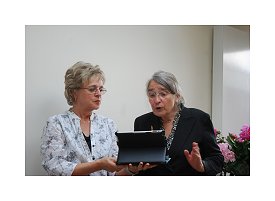
Emma Crebolder (R) & Heilna du Plooy (L)
Vertaalvrucht (nr 3): Emma Crebolder & Heilna du Plooy
Literaire Salon in’t Wevershuisje 3
Ons vruchtbaarst verleden
Ons vruchtbaarst verleden lag
in geschriften en bij rivieren, op
keien of stenen aan Schelde of Waal.
De stroming sleepte ons mee.
We moesten de verhalen vinden.
Schorrevaar is achtergebleven. Ze
speelt met uitgeklapte vleugels voor
boek. Ze omvangt de meeuw en
gooit haar trots mijlenver op en wijst,
kijk daar: vriendin van schorrevaar.
Emma Crebolder
Ons vrugbaarste verlede
Ons vrugbaarste verlede is op papier
en langs riviere vasgelê, op die keie
of klippe langs die Schelde of die Waal.
Die stroming het ons meegevoer.
Ons moes na die verhale soek.
Waterraaf het agtergebly. Sy flap
haar vlerke soos ’n boek wyd oop.
Sy omhels die meeu en gooi haar
trots hoog op in die lug en wys,
kyk daar: die vriendin van waterraaf.
Heilna du Plooy
Vertaling naar het Zuidafrikaans
Vertaalvrucht (nr 3): Emma Crebolder & Heilna du Plooy
Literaire Salon in’t Wevershuisje 3, foto Carina van der Walt
Gedicht en vertaling eerder gepubliceerd in Literair Tijdschrift Ambrozijn, Brugge
fleursdumal.nl magazine
More in: Archive C-D, Crebolder, Emma, Heilna du Plooy, Literaire Salon in 't Wevershuisje, LITERARY MAGAZINES
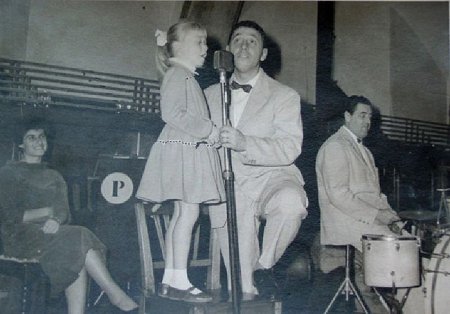
Een gastoptreden in de taverna van Dreher
De oorspronkelijk uit Triëst afkomstige Lionella Delcampo stuurde een bijzondere foto voor onze rubriek. Ze had er een mooi verhaal bij, maar ja, de Groningse kunstenares komt dan ook uit een familie die vol verhalen zit, waaronder een aantal dramatische van tijdens de oorlog.
“Triëst had na de oorlog een aparte status”, zo vertelt ze. “Denk aan de lijn Lübeck-Triëst-Korfu: het IJzeren Gordijn, dat West- en Oost-Europa scheidde. In die tijd werd mijn vader aangenomen als hulpje in de keuken van de Amerikaanse soldaten die gelegerd waren in de stad. Ze hadden hem voor later een goede beroepsopleiding beloofd, toen een lot uit de loterij, maar het ging toch anders…Op 1 mei, Dag van de Arbeid, mocht m’n vader van zijn eigen vader niet gaan werken en dat betekende ontslag op staande voet en voor het verdere leven als ‘rood’ aangemerkt staan.”
“Er. heerste in de jaren na de oorlog grote werkloosheid”, vervolgt Lionella. “Mijn vader besloot toen, net zoals zoveel anderen, met zijn gezin te emigreren. Mijn ouders waren beide zesentwintig, mijn broertje tweeëneenhalf en ik vijf. We ondernamen een lange reis per stoomboot, een maand op zee. Een avontuur vol onvergetelijke indrukken voor een kind van die leeftijd. Het einddoel was Zuid-Amerika en wel de Chileense hoofdstad Santiago.”
Nanny
“Ik bewaar mijn mooiste herinneringen aan die tijd”, vervolgt Lionella haar verhaal. “Terwijl het voor mijn moeder een afschuwelijke periode geweest is: eenzaam en de taal niet machtig aan de andere kant van de wereld, ver van de familie, zonder telefoon of computer met Skype zoals vandaag de dag. Men communiceerde toen slechts met brieven geschreven op flinterdun blauw papier, en die waren eindeloos onderweg. Als er een vliegtuig overvloog zwaaiden wij kinderen altijd, schreeuwend: “Daaaag! Doe de groeten aan opa en omaaaa!”. Emigreren betekende toen elkaar nooit meer zien. Mijn moeder heeft veel gehuild.”
“Twee jaar later werd ons zusje geboren. In het ziekenhuis waar mijn moeder bevallen was, werkte een jonge verpleegster: Gaby Araya. Ze raakte met ons gezinnetje bevriend en werd de peetmoeder van de nieuwe baby. Ze kwam zó vaak bij ons over de vloer, dat je haar terecht onze nanny zou kunnen noemen. Ze was beeldschoon, droeg fleurige kleren en zwierige rokken en ze kon prachtig zingen. Ik leerde van haar het Castellano, dat ik toen vloeiend sprak en nu nog steeds goed versta. Van haar leerde ik ook diverse Spaanstalige liederen.”
Pippo
En dat brengt ons weer terug naar de foto.
Lionella: “Werk vinden was voor mijn vader in Chili ook niet makkelijk. De sociale verschillen waren extreem: goed in de centen of straatarm, wij hoorden bij geen van beide. Zodoende zijn we in 1958 weer teruggegaan naar Triëst. De foto waar het hierover gaat is kort erna genomen, ik was dus een jaar of zeven, acht.”
“Met de hele familie gingen we vaak ‘s avonds uit eten in de “taverna” van de Birreria Dreher, een bekende bierbrouwerij in Triëst. Je kon er op z’n ouderwets Habsburgs eten en natuurlijk bier drinken. ‘s Zomers zat je in de zeer grote tuin buiten, ‘s winters binnen. Er speelde een uitstekende band, vooral jazzy muziek. De leider heette Pippo…- de achternaam schiet me niet te binnen – die fantastisch klarinet speelde en ze hadden ook een mooie, goede én leuke zangeres.”
“Op een avond dat we daar waren was de band ter ore gekomen dat ik mooi in het Spaans kon zingen. En toen mocht ik, omdat ik zo klein was, op een stoel gaan staan en het laten horen. Zo te zien aan de uitdrukking van Pippo die naast me bij de microfoon staat, moet het vast de Malagueña zijn die ik aan het zingen was, met héééééle lange uithalen!”
Het gastoptreden werd een succes en zou ook zeker niet het laatste zijn, want zang en muziek zijn onverbrekelijk verbonden met het leven van deze bijzondere Groningse portretschilderes.
Joep Eijkens
fleursdumal.nl magazine
eerder gepubliceerd op www.cubra.nl
More in: - Fotoalbum Joep Eijkens, - Objets Trouvés (Ready-Mades)
Boudewijn Smits
VPRO boeken
Uitzending zondag 27 april 2014 om 11.20 uur op Nederland 1
Boudewijn Smits is historicus en schreef de biografie Loe de Jong, 1914-2005, Historicus met een missie.
Dr. Loe de Jong heeft als geen ander de beeldvorming van het Nederlandse volk over het oorlogsverleden gedomineerd. Een telefoonboek van de Tweede Wereldoorlog. Zo omschrijft historicus Boudewijn Smits het monumentale werk van Loe de Jong, de twaalf delen over Nederland tijdens de tweede wereldoorlog.
# meer informatie op website vproboeken
fleursdumal.nl magazine
More in: - Book News, Art & Literature News, BIOGRAPHY
 Jacob & Wilhelm Grimm ♦ The Girl Without Hands or The Armless Maiden ♦ A certain miller had little by little fallen into poverty, and had nothing left but his mill and a large apple-tree behind it. Once when he had gone into the forest to fetch wood, an old man stepped up to him whom he had never seen before, and said, “Why dost thou plague thyself with cutting wood, I will make thee rich, if thou wilt promise me what is standing behind thy mill?” – “What can that be but my apple-tree?” thought the miller, and said, “Yes,” and gave a written promise to the stranger. He, however, laughed mockingly and said, “When three years have passed, I will come and carry away what belongs to me,” and then he went. When the miller got home, his wife came to meet him and said, “Tell me, miller, from whence comes this sudden wealth into our house? All at once every box and chest was filled; no one brought it in, and I know not how it happened.” He answered, “It comes from a stranger who met me in the forest, and promised me great treasure. I, in return, have promised him what stands behind the mill; we can very well give him the big apple-tree for it.” – “Ah, husband,” said the terrified wife, “that must have been the Devil! He did not mean the apple-tree, but our daughter, who was standing behind the mill sweeping the yard.”
Jacob & Wilhelm Grimm ♦ The Girl Without Hands or The Armless Maiden ♦ A certain miller had little by little fallen into poverty, and had nothing left but his mill and a large apple-tree behind it. Once when he had gone into the forest to fetch wood, an old man stepped up to him whom he had never seen before, and said, “Why dost thou plague thyself with cutting wood, I will make thee rich, if thou wilt promise me what is standing behind thy mill?” – “What can that be but my apple-tree?” thought the miller, and said, “Yes,” and gave a written promise to the stranger. He, however, laughed mockingly and said, “When three years have passed, I will come and carry away what belongs to me,” and then he went. When the miller got home, his wife came to meet him and said, “Tell me, miller, from whence comes this sudden wealth into our house? All at once every box and chest was filled; no one brought it in, and I know not how it happened.” He answered, “It comes from a stranger who met me in the forest, and promised me great treasure. I, in return, have promised him what stands behind the mill; we can very well give him the big apple-tree for it.” – “Ah, husband,” said the terrified wife, “that must have been the Devil! He did not mean the apple-tree, but our daughter, who was standing behind the mill sweeping the yard.”
The miller’s daughter was a beautiful, pious girl, and lived through the three years in the fear of God and without sin. When therefore the time was over, and the day came when the Evil-one was to fetch her, she washed herself clean, and made a circle round herself with chalk. The devil appeared quite early, but he could not come near to her. Angrily, he said to the miller, “Take all water away from her, that she may no longer be able to wash herself, for otherwise I have no power over her.” The miller was afraid, and did so. The next morning the devil came again, but she had wept on her hands, and they were quite clean. Again he could not get near her, and furiously said to the miller, “Cut her hands off, or else I cannot get the better of her.” The miller was shocked and answered, “How could I cut off my own child’s hands?” Then the Evil-one threatened him and said, “If thou dost not do it thou art mine, and I will take thee thyself.” The father became alarmed, and promised to obey him. So he went to the girl and said, “My child, if I do not cut off both thine hands, the devil will carry me away, and in my terror I have promised to do it. Help me in my need, and forgive me the harm I do thee.” She replied, “Dear father, do with me what you will, I am your child.” Thereupon she laid down both her hands, and let them be cut off. The devil came for the third time, but she had wept so long and so much on the stumps, that after all they were quite clean. Then he had to give in, and had lost all right over her.
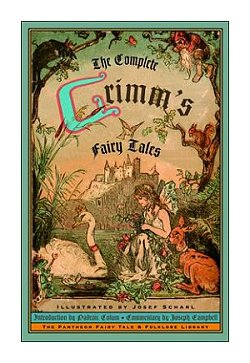 The miller said to her, “I have by means of thee received such great wealth that I will keep thee most delicately as long as thou livest.” But she replied, “Here I cannot stay, I will go forth, compassionate people will give me as much as I require.” Thereupon she caused her maimed arms to be bound to her back, and by sunrise she set out on her way, and walked the whole day until night fell. Then she came to a royal garden, and by the shimmering of the moon she saw that trees covered with beautiful fruits grew in it, but she could not enter, for there was much water round about it. And as she had walked the whole day and not eaten one mouthful, and hunger tormented her, she thought, “Ah, if I were but inside, that I might eat of the fruit, else must I die of hunger!” Then she knelt down, called on God the Lord, and prayed. And suddenly an angel came towards her, who made a dam in the water, so that the moat became dry and she could walk through it. And now she went into the garden and the angel went with her. She saw a tree covered with beautiful pears, but they were all counted. Then she went to them, and to still her hunger, ate one with her mouth from the tree, but no more. The gardener was watching; but as the angel was standing by, he was afraid and thought the maiden was a spirit, and was silent, neither did he dare to cry out, or to speak to the spirit. When she had eaten the pear, she was satisfied, and went and concealed herself among the bushes. The King to whom the garden belonged, came down to it next morning, and counted, and saw that one of the pears was missing, and asked the gardener what had become of it, as it was not lying beneath the tree, but was gone. Then answered the gardener, “Last night, a spirit came in, who had no hands, and ate off one of the pears with its mouth.” The King said, “How did the spirit get over the water, and where did it go after it had eaten the pear?” The gardener answered, “Some one came in a snow-white garment from heaven who made a dam, and kept back the water, that the spirit might walk through the moat. And as it must have been an angel, I was afraid, and asked no questions, and did not cry out. When the spirit had eaten the pear, it went back again.” The King said, “If it be as thou sayest, I will watch with thee to-night.”
The miller said to her, “I have by means of thee received such great wealth that I will keep thee most delicately as long as thou livest.” But she replied, “Here I cannot stay, I will go forth, compassionate people will give me as much as I require.” Thereupon she caused her maimed arms to be bound to her back, and by sunrise she set out on her way, and walked the whole day until night fell. Then she came to a royal garden, and by the shimmering of the moon she saw that trees covered with beautiful fruits grew in it, but she could not enter, for there was much water round about it. And as she had walked the whole day and not eaten one mouthful, and hunger tormented her, she thought, “Ah, if I were but inside, that I might eat of the fruit, else must I die of hunger!” Then she knelt down, called on God the Lord, and prayed. And suddenly an angel came towards her, who made a dam in the water, so that the moat became dry and she could walk through it. And now she went into the garden and the angel went with her. She saw a tree covered with beautiful pears, but they were all counted. Then she went to them, and to still her hunger, ate one with her mouth from the tree, but no more. The gardener was watching; but as the angel was standing by, he was afraid and thought the maiden was a spirit, and was silent, neither did he dare to cry out, or to speak to the spirit. When she had eaten the pear, she was satisfied, and went and concealed herself among the bushes. The King to whom the garden belonged, came down to it next morning, and counted, and saw that one of the pears was missing, and asked the gardener what had become of it, as it was not lying beneath the tree, but was gone. Then answered the gardener, “Last night, a spirit came in, who had no hands, and ate off one of the pears with its mouth.” The King said, “How did the spirit get over the water, and where did it go after it had eaten the pear?” The gardener answered, “Some one came in a snow-white garment from heaven who made a dam, and kept back the water, that the spirit might walk through the moat. And as it must have been an angel, I was afraid, and asked no questions, and did not cry out. When the spirit had eaten the pear, it went back again.” The King said, “If it be as thou sayest, I will watch with thee to-night.”
When it grew dark the King came into the garden and brought a priest with him, who was to speak to the spirit. All three seated themselves beneath the tree and watched. At midnight the maiden came creeping out of the thicket, went to the tree, and again ate one pear off it with her mouth, and beside her stood the angel in white garments3. Then the priest went out to them and said, “Comest thou from heaven or from earth? Art thou a spirit, or a human being?” She replied, “I am no spirit, but an unhappy mortal deserted by all but God.” The King said, “If thou art forsaken by all the world, yet will I not forsake thee.” He took her with him into his royal palace, and as she was so beautiful and good, he loved her with all his heart, had silver hands made for her, and took her to wife.
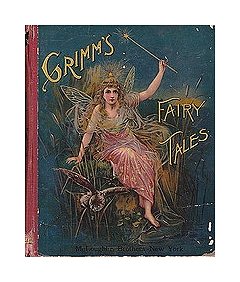 After a year the King had to take the field4, so he commended his young Queen to the care of his mother and said, “If she is brought to bed take care of her, nurse her well, and tell me of it at once in a letter.” Then she gave birth to a fine boy. So the old mother made haste to write and announce the joyful news to him. But the messenger rested by a brook on the way, and as he was fatigued by the great distance, he fell asleep. Then came the Devil, who was always seeking to injure the good Queen, and exchanged the letter for another, in which was written that the Queen had brought a monster into the world. When the King read the letter he was shocked and much troubled, but he wrote in answer that they were to take great care of the Queen and nurse her well until his arrival. The messenger went back with the letter, but rested at the same place and again fell asleep. Then came the Devil once more, and put a different letter in his pocket, in which it was written that they were to put the Queen and her child to death. The old mother was terribly shocked when she received the letter, and could not believe it. She wrote back again to the King, but received no other answer, because each time the Devil substituted a false letter, and in the last letter it was also written that she was to preserve the Queen’s tongue and eyes as a token that she had obeyed.
After a year the King had to take the field4, so he commended his young Queen to the care of his mother and said, “If she is brought to bed take care of her, nurse her well, and tell me of it at once in a letter.” Then she gave birth to a fine boy. So the old mother made haste to write and announce the joyful news to him. But the messenger rested by a brook on the way, and as he was fatigued by the great distance, he fell asleep. Then came the Devil, who was always seeking to injure the good Queen, and exchanged the letter for another, in which was written that the Queen had brought a monster into the world. When the King read the letter he was shocked and much troubled, but he wrote in answer that they were to take great care of the Queen and nurse her well until his arrival. The messenger went back with the letter, but rested at the same place and again fell asleep. Then came the Devil once more, and put a different letter in his pocket, in which it was written that they were to put the Queen and her child to death. The old mother was terribly shocked when she received the letter, and could not believe it. She wrote back again to the King, but received no other answer, because each time the Devil substituted a false letter, and in the last letter it was also written that she was to preserve the Queen’s tongue and eyes as a token that she had obeyed.
But the old mother wept to think such innocent blood was to be shed, and had a hind brought by night and cut out her tongue and eyes, and kept them. Then said she to the Queen, “I cannot have thee killed as the King commands, but here thou mayst stay no longer. Go forth into the wide world with thy child, and never come here again.” The poor woman tied her child on her back, and went away with eyes full of tears. She came into a great wild forest, and then she fell on her knees and prayed to God, and the angel of the Lord appeared to her and led her to a little house on which was a sign with the words, “Here all dwell free.” A snow-white maiden came out of the little house and said, ‘Welcome, Lady Queen,” and conducted her inside. Then they unbound the little boy from her back, and held him to her breast that he might feed, and laid him in a beautifully-made little bed. Then said the poor woman, “From whence knowest thou that I was a queen?” The white maiden answered, “I am an angel sent by God, to watch over thee and thy child.” The Queen stayed seven7 years in the little house, and was well cared for, and by God’s grace, because of her piety, her hands which had been cut off, grew once more.
At last the King came home again from the war, and his first wish was to see his wife and the child. Then his aged mother began to weep and said, “Thou wicked man, why didst thou write to me that I was to take those two innocent lives?” and she showed him the two letters which the Evil-one had forged, and then continued, “I did as thou badest me,” and she showed the tokens, the tongue and eyes. Then the King began to weep for his poor wife and his little son so much more bitterly than she was doing, that the aged mother had compassion on him and said, “Be at peace, she still lives; I secretly caused a hind to be killed, and took these tokens from it; but I bound the child to thy wife’s back and bade her go forth into the wide world, and made her promise never to come back here again, because thou wert so angry with her.” Then spoke the King, “I will go as far as the sky is blue, and will neither eat nor drink until I have found again my dear wife and my child, if in the meantime they have not been killed, or died of hunger.”
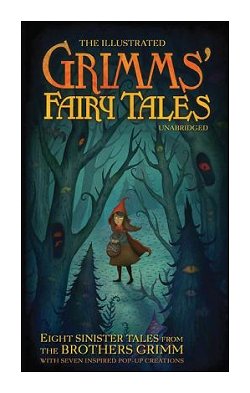 Thereupon the King travelled about for seven long years, and sought her in every cleft of the rocks and in every cave, but he found her not, and thought she had died of want. During the whole of this time he neither ate nor drank, but God supported him. At length he came into a great forest, and found therein the little house whose sign was, “Here all dwell free.” Then forth came the white maiden, took him by the hand, led him in, and said, “Welcome, Lord King,” and asked him from whence he came. He answered, “Soon shall I have travelled about for the space of seven years, and I seek my wife and her child, but cannot find them.” The angel offered him meat and drink, but he did not take anything, and only wished to rest a little. Then he lay down to sleep, and put a handkerchief over his face.
Thereupon the King travelled about for seven long years, and sought her in every cleft of the rocks and in every cave, but he found her not, and thought she had died of want. During the whole of this time he neither ate nor drank, but God supported him. At length he came into a great forest, and found therein the little house whose sign was, “Here all dwell free.” Then forth came the white maiden, took him by the hand, led him in, and said, “Welcome, Lord King,” and asked him from whence he came. He answered, “Soon shall I have travelled about for the space of seven years, and I seek my wife and her child, but cannot find them.” The angel offered him meat and drink, but he did not take anything, and only wished to rest a little. Then he lay down to sleep, and put a handkerchief over his face.
Thereupon the angel went into the chamber where the Queen sat with her son, whom she usually called “Sorrowful,” and said to her, “Go out with thy child, thy husband hath come.” So she went to the place where he lay, and the handkerchief fell from his face. Then said she, “Sorrowful, pick up thy father’s handkerchief, and cover his face again.” The child picked it up, and put it over his face again. The King in his sleep heard what passed, and had pleasure in letting the handkerchief fall once more. But the child grew impatient, and said, “Dear mother, how can I cover my father’s face when I have no father in this world? I have learnt to say the prayer, ‘Our Father, which art in Heaven,’ thou hast told me that my father was in Heaven, and was the good God, and how can I know a wild man like this? He is not my father.” When the King heard that, he got up, and asked who they were. Then said she, “I am thy wife, and that is thy son, Sorrowful.” And he saw her living hands, and said, “My wife had silver hands.” She answered, “The good God has caused my natural hands to grow again;” and the angel went into the inner room, and brought the silver hands, and showed them to him. Hereupon he knew for a certainty that it was his dear wife and his dear child, and he kissed them, and was glad, and said, “A heavy stone has fallen from off mine heart.” Then the angel of God gave them one meal with her, and after that they went home to the King’s aged mother. There were great rejoicings everywhere, and the King and Queen were married again, and lived contentedly to their happy end.
THE END
Jacob Grimm (1785-1863) & Wilhelm Grimm (1786-1859). This Brothers Grimm version of the story has been translated in 1844 into English by Margarate Hunt. KHM1 031: Kinder- und Hausmärchen (Children’s and Household Tales)
fleursdumal.nl magazine
More in: Grimm, Grimm, Jacob & Wilhelm
Acht vertalingen van gedichten van T.T. Cloete (1924) door Carina van der Walt & Geno Spoormans
T.T. Cloete
rokke
juwele die onthou ek eintlik nie
van hoede toentertyd met tulle
onthou ek vaag maar rokke
so baie helderte het ek van húlle
daar was die houtskoolrok
met loodgrijs kolle Tarentaal
die een met troupantkleure
haar naam was Fluister-Asemhaal-
van-Blomme as jy loop
of hier en daar selfs in ’n stoel
doodstil rondsit
die bloue was My-Hartklop-Voel-
Onder-My-Bors
die swart-en-wit gestreepte een Sebra
vir meestal saans
met uitgaan dra
en dan die Pronksingvink
die een met swart-en-geel
sy hang ’n graspluim in die wind
wat oor haar saggies streel
daar was die nuwerwetse een
met ingeweefde kreuk
hoe mens haar ook al was of stryk
met byna vleeslik haar eksoties Vreemde Reuk
een was ’n hele Ruim Landskap
die lemmetjiegroene
vol grasveld water sonne geel
lemoene
en toe jy kwalik was en skuifelend
het ons ’n nuwe wéér gekoop
en lieg-lieg-lag-lag het ons haar
Stilstreel-Saggies-Soen gedoop
en dan was daar ’n allerlaaste een
ontwerp deur hartseerliefde nee
so menslik op ons afgedwing
te onvertaalbaar nee
om haar ’n naam te gee
T.T. Cloete
jurken
juwelen herinner ik me eigenlijk niet
hoeden met tule toentertijd
onthoud ik vaag maar jurken
staan mij voor ogen in volle helderheid
er was een houtskooljurk
met loodgrijze stippen Parelhoen
een scharrelaar vol bonte kleuren
haar naam was Nog-Zachter-Doen-
dan-Bloemen als je liep
of hier en daar zelfs in stoelen
doodstil wat rondhing
de blauwe was Mijn-Hartslag-Voelen-
Onder-Mijn-Borst
de zwart-wit gestreepte Zebra
meestal voor ’s avonds
bij een gala
en dan de Pronkzingvink
die ene in zwarten en gelen
zij hangt als rietpluimen in de wind
die zachtjes over haar strelen
dan was er eentje niet te strijken
van een hoogst modern tailleur
met ingeweven kreuken
en haar bijna lijfelijk exotische Vreemde Geur
een was een heel Ruim Landschap
het limoengroene
veld vol gras water zon en gele
citroenen
en toen je nog maar kwalijk was en schuifelde
hebben we wéér een nieuwe gehaald
en steels stout hebben we haar
als Stilletjes-Zachtjes-Zoenen vertaald
en dan was er de allerlaatste
ontworpen door treurliefde nee
zo doodgewoon aan het leven
te onvertaalbaar
om haar een naam te geven
T.T. Cloete 8 gedichten: Vertalingen uit het Zuid-Afrikaans door Carina van der Walt & Geno Spoormans, 2010 – slot gedicht 1-8
fleursdumal.nl magazine
More in: Archive C-D, T .T. Cloete, Walt & Spoormans

Hans Hermans photos: Island (Terschelling) II
hanshermans©2014
fleursdumal.nl magazine
More in: Dutch Landscapes, Hans Hermans Photos, Photography
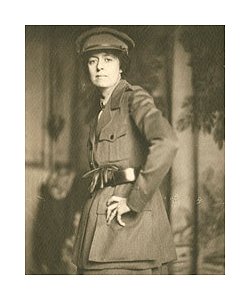
Eunice Tietjens
(1884 – 1944)
The Dandy
He swaggers in green silk and his two coats are lined
with fur. Above his velvet shoes his trim, bound
ankles twinkle pleasantly.
His nails are of the longest.
Quite the glass of fashion is Mr. Chu!
In one slim hand–the ultimate punctilio–dangles
a bamboo cage, wherein a small brown bird sits
with a face of perpetual surprise.
Mr. Chu smiles the benevolent smile of one who satisfies
both fashion and a tender heart.
Does not a bird need an airing?
(Wusih)
Eunice Tietjens poetry
fleursdumal.nl magazine
More in: Archive S-T, Tietjens, Eunice
 The Sorrows of Young Werther (30) by J.W. von Goethe ♦ AUGUST 21. ♦ In vain do I stretch out my arms toward her when I awaken in the morning from my weary slumbers. In vain do I seek for her at night in my bed, when some innocent dream has happily deceived me, and placed her near me in the fields, when I have seized her hand and covered it with countless kisses. And when I feel for her in the half confusion of sleep, with the happy sense that she is near, tears flow from my oppressed heart; and, bereft of all comfort, I weep over my future woes.
The Sorrows of Young Werther (30) by J.W. von Goethe ♦ AUGUST 21. ♦ In vain do I stretch out my arms toward her when I awaken in the morning from my weary slumbers. In vain do I seek for her at night in my bed, when some innocent dream has happily deceived me, and placed her near me in the fields, when I have seized her hand and covered it with countless kisses. And when I feel for her in the half confusion of sleep, with the happy sense that she is near, tears flow from my oppressed heart; and, bereft of all comfort, I weep over my future woes.
♦ AUGUST 22. ♦ What a misfortune, Wilhelm! My active spirits have degenerated into contented indolence. I cannot be idle, and yet I am unable to set to work. I cannot think: I have no longer any feeling for the beauties of nature, and books are distasteful to me. Once we give ourselves up, we are totally lost. Many a time and oft I wish I were a common labourer; that, awakening in the morning, I might have but one prospect, one pursuit, 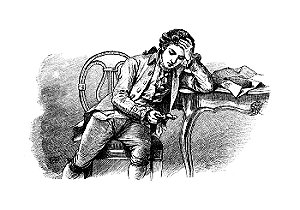 one hope, for the day which has dawned. I often envy Albert when I see him buried in a heap of papers and parchments, and I fancy I should be happy were I in his place. Often impressed with this feeling I have been on the point of writing to you and to the minister, for the appointment at the embassy, which you think I might obtain. I believe I might procure it. The minister has long shown a regard for me, and has frequently urged me to seek employment. It is the business of an hour only. Now and then the fable of the horse recurs to me. Weary of liberty, he suffered himself to be saddled and bridled, and was ridden to death for his pains. I know not what to determine upon. For is not this anxiety for change the consequence of that restless spirit which would pursue me equally in every situation of life?
one hope, for the day which has dawned. I often envy Albert when I see him buried in a heap of papers and parchments, and I fancy I should be happy were I in his place. Often impressed with this feeling I have been on the point of writing to you and to the minister, for the appointment at the embassy, which you think I might obtain. I believe I might procure it. The minister has long shown a regard for me, and has frequently urged me to seek employment. It is the business of an hour only. Now and then the fable of the horse recurs to me. Weary of liberty, he suffered himself to be saddled and bridled, and was ridden to death for his pains. I know not what to determine upon. For is not this anxiety for change the consequence of that restless spirit which would pursue me equally in every situation of life?
The Sorrows of Young Werther (Die Leiden des jungen Werther) by J.W. von Goethe. Translated by R.D. Boylan
To be continued
fleursdumal.nl magazine for art & literature
More in: -Die Leiden des jungen Werther, Goethe, Johann Wolfgang von
Thank you for reading Fleurs du Mal - magazine for art & literature